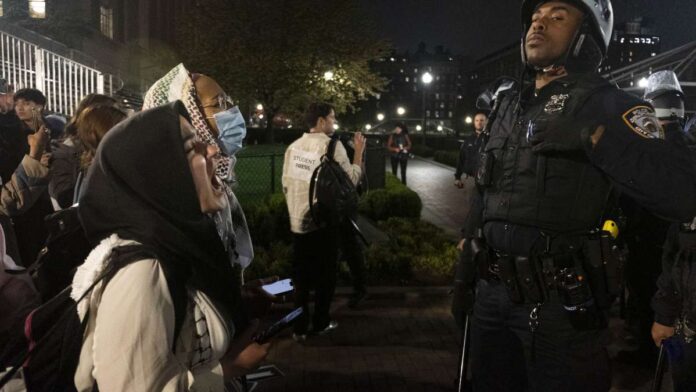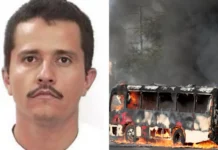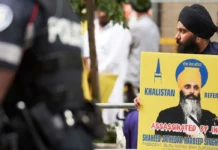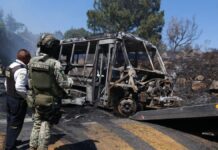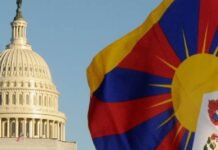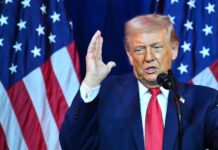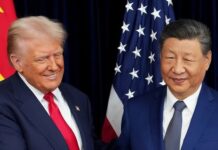NEW YORK: Demonstrations reverberated across university campuses in the United States as tensions surrounding Israel’s military actions in Gaza intensified. The night was marked by widespread arrests in New York and a disturbing attack by counter-protesters in California, Al Jazeera reported.
In New York City, the NYPD reported as many as 282 arrests at Columbia University and the City College of New York, spanning from Tuesday night into Wednesday morning. This crackdown unfolded as law enforcement cleared students who had occupied Columbia University’s Hamilton Hall since April 30.
Hamilton Hall, previously synonymous with activism during South Africa’s struggle against apartheid, gained a new moniker: “Hind’s Hall,” in memory of six-year-old Hind Rajab, tragically killed with her family by Israeli forces in Gaza.
Meghnad Bose, a student journalist at Columbia University, recounted witnessing the police intervention firsthand. “I saw firsthand how the police dispersed those protests, arrested them and sometimes got pretty aggressive in making sure the protesters went away,” he said, according to Al Jazeera.
Kaz Daughtry, the NYPD’s deputy commissioner of operations, in a post on X, highlighted Columbia University’s request for police assistance in reclaiming their campus. He said the police were “dispersing the unlawful encampment and persons barricaded inside of university buildings and restoring order”.
Meanwhile, at the University of California Los Angeles (UCLA), tensions escalated as pro-Israel counter-protesters clashed with pro-Palestine demonstrators. Witnesses reported attempts by the assailants to dismantle the pro-Palestine encampment, resorting to violence by hurling objects and wielding sticks.
Sergio Olmos, an investigative journalist reporting from UCLA, observed the chaotic scene as counter-protesters engaged in aggressive behaviour. He detailed their efforts to dismantle the pro-Palestine encampment, including throwing glass bottles and wielding sticks.
The Los Angeles Police Department responded to the escalating violence at UCLA at the university’s request, addressing multiple incidents of aggression within the encampment.
Despite the turmoil, the pro-Palestine encampment at UCLA persisted, with student protesters holding their ground against the attacks. Rob Reynolds, reporting from Los Angeles, highlighted the resilience of the demonstrators amid adversity.
The surge in protests across US campuses stemmed from heightened tensions following Hamas’ attack on southern Israel on October 7 and the prolonged Israeli military campaign in Gaza, resulting in staggering Palestinian casualties, as reported by Al Jazeera.
The recent wave of demonstrations gained momentum nearly two weeks prior, sparked by Columbia University President Minouche Shafik’s contentious testimony before a US congressional committee. Critics accused Shafik of prioritizing lawmakers’ interests over those of the university’s students.
Amid an array of demands, protesters called for divestment from Israel and companies associated with the conflict. They denounced administrators for allegedly exploiting public safety concerns and weaponising accusations of anti-Semitism to suppress dissent.
The wave of arrests extended beyond New York, with 14 protesters detained at Tulane University in New Orleans, alongside arrests at the University of South Florida and the University of Wisconsin, Madison.
The protests garnered international attention, with Francesca Albanese, the UN special rapporteur on the occupied Palestinian territory, condemning the violent police response at US universities. She decried the actions as reflective of a dystopian reality and called for an end to the ongoing genocide.
In Los Angeles, Mayor Karen Bass condemned the violence at UCLA as abhorrent and inexcusable. New York City Mayor Eric Adams defended the police crackdown, attributing the protests at Columbia University to individuals unaffiliated with the institution.
Jewish Voice for Peace (JVP) criticised both the NYPD and Columbia University for their handling of the situation. Stefanie Fox, the group’s executive director, drew parallels between the university’s current actions and its past oppression of student activism during the Vietnam War and South African apartheid era, Al Jazeera reported. (ANI)
Also Read: Jaishankar speaks to Palestinian PM, reiterates India’s long-standing position on Palestine

